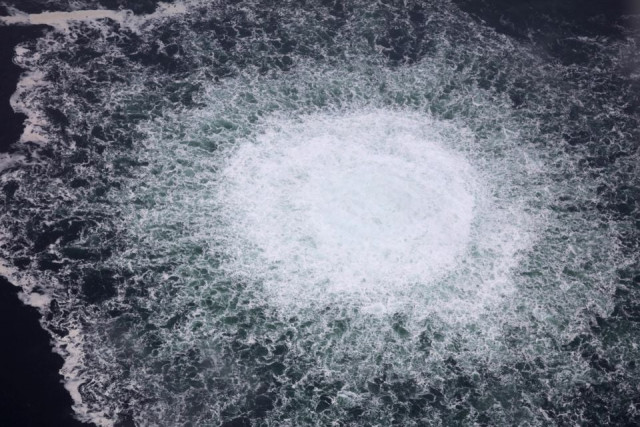Sweden sends diving vessel to probe leaking Nord Stream pipelines
Europe is investigating what caused three pipelines in Nord Stream network to burst in an act of suspected sabotage

Sweden sent a diving vessel on Monday to the site of Russian gas pipelines in the Baltic Sea that ruptured last week following blasts in the area, to probe an incident that has added new tension to Europe's energy crisis.
Europe is investigating what caused three pipelines in the Nord Stream network to burst in an act of suspected sabotage near Swedish and Danish waters that Moscow quickly sought to pin on the West, suggesting the United States stood to gain.
Nord Stream, which runs from Russia to Germany, has been at the centre of a growing gas supply crisis in Europe, which until recently relied heavily on Russian fuel, sending prices soaring.
Several European Union states have triggered emergency plans that may lead to rationing as they race to find alternative supplies, while Britain now faces a "significant risk" of gas shortages this winter, the regulator said.
Read more: Russia says Nord Stream likely hit by state-backed 'terrorism'
"The coast guard is responsible for the mission, but we are supporting them with units," a spokesperson for the Swedish navy, Jimmie Adamsson, told Reuters. "The only one we are naming is HMS Belos, which is a submarine rescue and diving vessel."
The Swedish coast guard said Nord Stream 1 had stopped leaking, but an overflight suggested gas was still draining out of Nord Stream 2 and bubbling to the surface over a 30 metre (32 yard) radius.
The Kremlin doubled down on allegations that the West was to blame for the ruptures on Monday, saying that the United States was able to increase sales and prices of its liquefied natural gas (LNG) as a result.
Washington has strongly denied any involvement. European countries suspect sabotage, but have declined to say who could be behind it.
Kremlin-controlled Gazprom (GAZP.MM) also said flows could resume at the last remaining intact pipeline in the Nord Stream 2 network, a suggestion likely to be rebuffed given Europe blocked Nord Stream 2 on the eve of Russia's invasion of Ukraine in February.
"If a decision is made to start deliveries through Nord Stream 2's line B, natural gas will be pumped into the pipeline after the integrity of the system has been checked and verified by supervisory authorities," Gazprom said.
Also read: Nord Stream rupture may mark biggest single methane release ever recorded, UN says
The suggestion follows remarks by Russia's deputy prime minister on Sunday that the Nord Stream network could be repaired, given time and enough funds.
Norway sends soldiers
Nord Stream has been a flashpoint in the energy standoff between the West and Moscow that has pummelled Western economies and fuelled a cost-of-living crisis.
Russia steadily reduced gas flows via Nord Stream 1 this year before halting them altogether at the end of August, blaming technical difficulties caused by Western sanctions. European countries said Moscow was using energy as a weapon.
Nord Stream 2 was never operational, and Western countries have resisted calls from Russia to drop their opposition to the project.
Jolted by the Nord Stream ruptures, European countries have started strengthening security and surveillance around critical infrastructure that could be vulnerable to attack.
Norway, Europe's main gas supplier and a major oil exporter, said it had deployed soldiers to guard major onshore oil and gas processing plants.
Italy has strengthened surveillance and controls on underwater energy and telecommunications cables, a source told Reuters.
Focus has also turned to the security of other gas supply lines. Eni, the biggest importer of Russian gas in Italy, at the weekend said Russia had halted all gas flows through the Tarvisio entry point, though its chief executive on Monday blamed the halt on short-term technical issues.
The stoppage of flows through the Tarvisio entry point "has absolutely nothing to do with geopolitical factors. It is due to the fact that Gazprom would have to pay a monetary guarantee for the transport of gas from Austria to Italy that was not there before," Claudio Descalzi said.
European Union countries meanwhile are trying to forge a consensus on a gas price cap, which is opposed by some countries including economic powerhouse Germany.
EU country leaders are set to ask the European Commission to propose a cap using "workable solutions", according to a draft statement seen by Reuters.
Hungary, which has been at loggerheads with Brussels and criticised Western sanctions on Russia, on Monday secured a deferral on payments for its winter gas supply.



















COMMENTS
Comments are moderated and generally will be posted if they are on-topic and not abusive.
For more information, please see our Comments FAQ